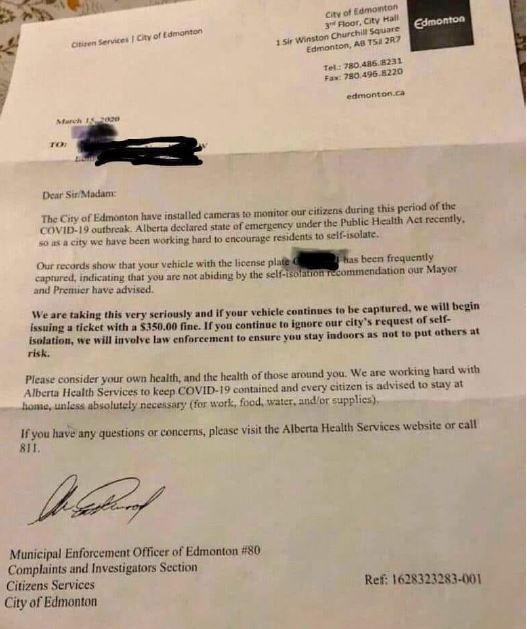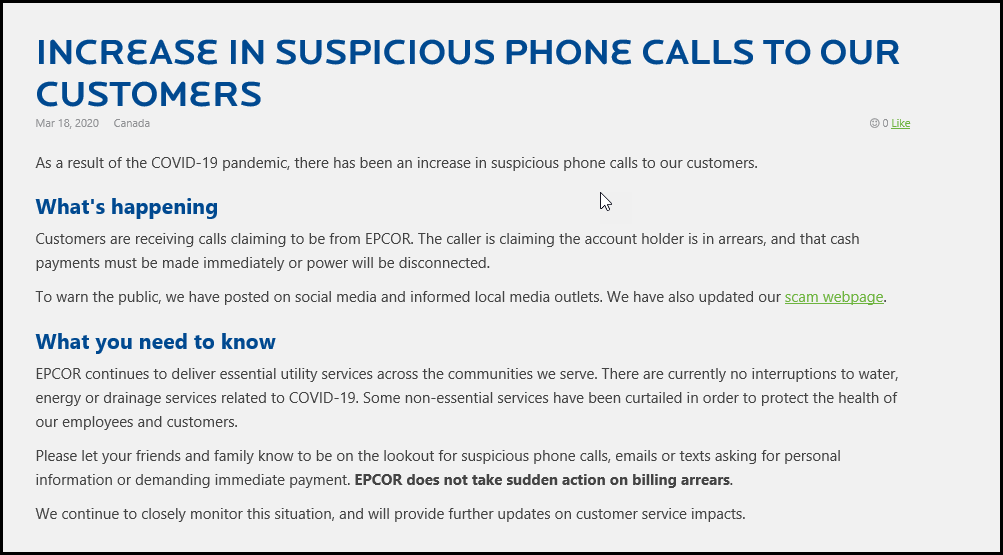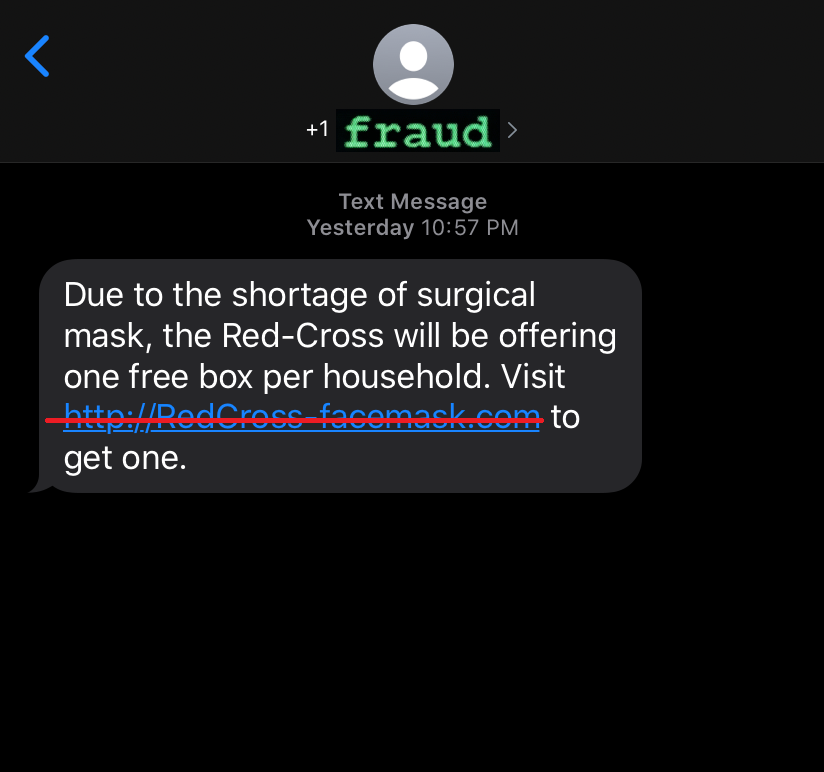The Edmonton Police Service would like to advise citizens to be aware of frauds related to COVID-19. Scammers feed off the timely fear, stresses, and panic that the COVID-19 pandemic is causing for many families to convince you of the urgency so you fall for their scam.
With any suspicious form of communication, take a moment to consider the offer:
• Why would this organization be contacting you?
• Why would they be offering free medical supplies to citizens when essential services have low supplies?
• Why would a legitimate organization use information communications and text you? Would they even know your cell phone number?
• Why would they have spelling errors, or send links to a website that’s not their official website?
• Why would you be charged for a health care service if you're a resident of Alberta, as such services are free in Alberta?
Take those few minutes away and conduct an online search of the person or organization who is contacting you. Look up the legitimate organization to find their proper website. Look for information about frauds. Search the phone number/email address the person used to make contact. Does the legitimate organization come up in the results?
If you are ever unsure – ask someone else! You can call the legitimate organization to ask or tell family members and friends. If someone thinks it’s suspicious, listen!
List of examples seen by/reported to the Edmonton Police Service
City of Edmonton Impersonation Letters

The City of Edmonton has been informed of letters being received by some residents, which say that the City is tracking people’s movements according to license plate numbers and threatening fines for violating self-isolation. These letters are fake and are not from the City of Edmonton. The City is not tracking people’s movements or isolation. Residents are to ignore these letters.
More information on what the City is doing can be found at edmonton.ca/covid-19.
Phishing Emails and COVID-19 Apps
Phishing emails advise the recipient that they have been in contact with a colleague, friend, or family member who has tested positive for the COVID-19 virus and instructs the recipient to print an ‘EmergencyContact.xlsm’ attachment and bring it with them to the nearest emergency clinic for testing.
When a user opens the attachment, they will be prompted to 'Enable Content' to view the protected document. If a user enables content, malicious macros will be executed to download a malware executable to the computer that will inject numerous processes into the legitimate Windows msiexec.exe file. This is done to hide the presence of the running malware and potentially evade detection by security programs. Preliminary analysis suggest that the malware will search for and possibly steal cryptocurrency wallets, steals web browser cookies with account login info, retrieve a list of programs running on the computer, look for open shares on the network, and retrieve local IP address information configured on the computer.
COVID-19 Relief Program from the Government of Canada
- Victim receives a text message from the fraudster, posing as a Government of Canada representative. The message contains a link for the victim to click on in order to apply for the relief program. This link asks for the victim's personal and banking information.
- Victim is sent to a fraudulent website to apply for the Government's Emergency Response Benefit and has their identity stolen.
- Victim's identity is stolen via Facebook, and the fraudster uses it to apply for the Government's Relief Program. The victim is now unable to apply for financial relief.
Please know that the Government of Canada will never contact you via text message, and you will never be contacted if you did not initiate the application; the Government of Canada does not have the resources to contact every citizen to see if they need/qualify for their relief. As always, never click on suspicious links, especially ones received from unknown senders, and ensure your social media accounts are locked down and have limited personal information.
Six-Year Shopping Raffle Phone Scam
Fraudster calls the victim and says they won a Six Year Shopping Raffle. The victim hangs up, assuming it’s a scam; fraudster calls back two hours later and tells the victim not to hang up, because the victim won a car and money.
The victim had to register for the prize by sending $2,500.00 in cash and provide them with victim’s bank account number, so they could deposit the prize money. The fraudster informed the victim that they did not receive the money, as the bank had blocked the transfer, so they now need them to send cash. The victim didn’t have the money, so the fraudster explains how the victim can get a line of credit to pay.
The victim was told that an agent would show up at the victim’s house and take them to a FedEx Authorized Shipping centre to send additional money. A cab showed up at the victim’s home, and the victim asked if the cab driver was the agent. Thankfully, the driver told the victim it was a scam and refused to drive to the FedEx location; instead the driver told the victim to go to police.
Again, the fraudster calls the victim and says, to get the vehicle prize, they needed to pay for a health inspection to make sure victim didn’t have COVID-19.
This victim lost $2500, but investigations found two unrelated fraud victims were involved in the transferring of funds; with these two additional victims, the scam had a monetary loss of over $10,000 in March 2020.
Police Impersonation Phone Scam
The scammer claimed to be an employee from a cell phone company and stated the victim’s phone number, registered in victim’s name, has been used to send false information about COVID-19 to Shanghai.
The victim’s phone number was used to send false information about COVID-19 to Shanghai, and the victim must report it to the police. The fraudster connected the victim to an employee of "Booshan Branch Police".
The victim is told that their information was being used for money laundering in China, and the fraudster was able to “prove” this, by providing government documents with “official” seals on them. The victim made a money transfer to the Hong Kong bank likely to cover fees/fines. The fraudster told the victim to delete all messages.
This had a monetary loss of over $15,000 in March.
EPCOR Impersonation

EPCOR has noticed an increase in fraudsters posing as employees. If you are contacted by someone claiming to be from EPCOR and they are threatening to disconnect your power if you do not pay immediately, they are trying to take your money or personal information. EPCOR has confirmed that there will be no interruptions to water, energy, or drainage services related to COVID-19. EPCOR does not take sudden action on billing arrears.
Medical Authority Impersonation
Scammers call victims pretending to be a medical authority, stating that a relative of the victim has fallen sick with the virus, or that the citizen has tested positive for the virus. The scammer requests payment for medical treatment.
Or scammers send emails or text messages claiming to be from national or global health authorities, with the aim of tricking victims to provide personal or financial information, or to open an attachment containing malware.
In many cases, the fraudsters impersonate legitimate companies, using similar names, websites, and email addresses in their attempt to trick unsuspecting members of the public, even reaching out proactively via emails and messages on social media platforms.
Free Medical Supplies Scam

Fraudsters are posing as legitimate organizations via email and text message with offers of free health care items if you click on a suspicious link. Other scammers are on buy and sell websites, “selling” health care items; however, when you send the money, you never receive the items.
Please be cautious! Do not click on any links from unknown senders, only purchase items from legitimate sellers, and research official organizations for their procedures and statements regarding COVID-19.